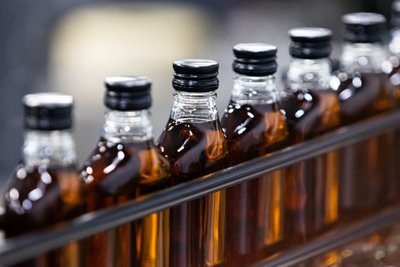The situation is improving, but there is still room for improvement
While one would like to believe that the problem of alcohol consumption in Lithuania is declining, there is still much to be done. According to a commentary by the Drug, Tobacco, and Alcohol Control Department, the 2021 study on the prevalence of psychoactive substance use in the general population, commissioned by the same department, reveals that 84.4% of Lithuanians aged 15-64 years have consumed alcohol in the last 12 months, and 62.8% have consumed alcohol in the last 30 days.
“Alcohol consumption remains more prevalent among men. In 2021, 86.7% of men and 82.1% of women reported having consumed alcohol in the last 12 months, while 72.4% of men and 53.2% of women reported having consumed alcohol in the last 30 days. In terms of age, the prevalence of alcohol consumption in the last 12 months and in the last 30 days was lowest among young people aged 15-24 years and highest among the age group of 25-54 years," statistics claim.
Since 2012, at the national level, Lithuania has been implementing an active alcohol control policy aimed at reducing alcohol consumption, its availability, especially for minors, alcohol abuse, and its damage to health and the economy. Most of the current restrictions have only come into force since 2018, according to the Drug, Tobacco, and Alcohol Control Department.
“Alcohol advertising has been banned, the time of sale of alcohol has been shortened, and the age of purchase and consumption has been raised from 18 to 20 years. The Law on Alcohol Control establishes the principles of state policy, which not only aims at limiting the promotion of alcohol sale and consumption in the Republic of Lithuania but also supports the planning of an alcohol-free living environment and the promotion of an alcohol-free social space,” the Drug, Tobacco, and Alcohol Control Department added.

Additionally, the commentary cites 2019 data from the World Health Organisation indicating that Lithuania is among the top five countries that have reduced alcohol consumption the most, having reduced its consumption of alcoholic beverages by as much as 17% from 2015 to 2019, from 15.4 litres of pure alcohol per capita to 12.8 litres. However, this figure is still 35% above the European average.
“Public surveys also indicate an improving situation. Alcohol consumption is decreasing most among children and young people. There are more positive developments: in 2022, there were fewer alcohol-related deaths, fewer offences related to alcohol consumption, and fewer accidents at work. As a result, with continuous alcohol prevention and control measures, alcohol consumption in the country should be expected to continue to decline," hopes the Drug, Tobacco, and Alcohol Control Department.
The importance of ensuring safe environment for young people
As highlighted in the Drug, Tobacco, and Alcohol Control Department commentary, alcohol remains the most common psychoactive substance, and its harm to human beings, especially to the young and still developing organism, is very high.
“At a younger age, the effects of psychoactive substances on the developing brain are more damaging. Early alcohol consumption can lead to the abuse of other psychoactive substances and the development of addiction in the future,” the representatives of the Department said.
For this reason, it is essential to be proactive and ensure that young people, especially minors, grow up in an environment without the problem of alcohol consumption.
“Children can be encouraged to use psychoactive substances, including alcohol, by a variety of risk factors, such as a family history of psychoactive substance use, poor social skills, educational failure or peer pressure and encouragement to use substances. The more risk factors a child is exposed to, the more likely he or she is to start using psychoactive substances. Prevention of psychoactive substance use reinforces protective factors that reduce the impact of risk aspects," the Drug, Tobacco, and Alcohol Control Department explained.

According to the Department, positive influences in the social environment in which a child grows up, studies, or spends time with peers can protect him or her from substance abuse attempts and reduce the influence of risk factors.
“As a child grows up, his or her relationships with family, school, or peers may change. Family influence is important for strengthening protective factors and avoiding potential risk factors when a child enters a new or changed social environment. Parents need to monitor the child’s social behavior, to be aware with who and in what environment the child spends time, and keep track of the child's academic results.
Parents should develop a negative attitude towards the use of psychoactive substances and establish certain rules and norms of behavior, including consequences for non-compliance. The younger the age at which psychoactive substances are introduced, the greater the likelihood of abuse and addiction. Therefore, it is important to set a good example from an early age, teaching children to live healthy lives and not to use psychoactive substances," stressed the Drug, Tobacco, and Alcohol Control Department.
Negative view on alcohol consumption
According to the Drug, Tobacco, and Alcohol Control Department, long-term trends offer hope for positive changes – it is likely that consistent and balanced policy in this area, an increase in awareness among the population, education of young people, and preventive activities will lead to a decrease in alcohol consumption.
“According to a survey on the prevalence of psychoactive substance use in the general population (15-64 years old), commissioned by the Drug, Tobacco, and Alcohol Control Department, despite the high level of alcohol consumption in Lithuania, the majority of Lithuanians, especially young individuals, negatively perceive alcohol consumption.
By age, the highest proportion of respondents with negative attitudes towards alcohol consumption was among the youngest (15-24 year olds) (76% in 2021 and 68% in 2016). Among young individuals aged 15-24, 78% of whom had consumed alcoholic beverages at least once in the last month, had a positive view of alcohol consumption, while among those who negatively perceive alcohol consumption, only half as many (37.5%) had consumed alcohol in the last month,” the results of the survey showed.

The Drug, Tobacco, and Alcohol Control Department has evaluated the survey results as positive and encouraging expectations for further decrease in alcohol consumption, if evidence-based alcohol control policies continue to be implemented and effective prevention measures are in place. While the situation in Lithuania is not yet perfect, it is important not only to ensure certain regulation of alcohol consumption but also discuss the harms it is causing and the problems that this harmful habit poses to society.
“Alcohol consumption cause both direct and indirect problems in society. Direct problems are related to alcohol intoxication and hangovers. Diseases and disorders associated with alcohol consumption are the examples of indirect problems, alcohol dependence also leads to serious social and psychological difficulties," the Drug, Tobacco, and Alcohol Control Department noted.
According to the Department, immoderate or frequent alcohol consumption causes problems detrimental to society, affecting workplaces, families, and increasing the risk of injuries, falls, and burns, especially road accidents.
“Alcohol consumption tends to provoke violence against oneself and others, increasing the risk of homicide, suicide, sexual assault, and domestic violence. Alcohol consumption by workers is of particular concern, especially in highly safety-sensitive occupations, such as those where workers are responsible for the health and well-being of others (e.g. pilots, doctors, safety technicians), and where intoxication can lead to serious consequences,” the commentary stressed.

Thus, according to the Drug, Tobacco, and Alcohol Control Department, a long-term, coherent, and balanced policy aimed at reducing both supply and demand, as well as raising public awareness, educating young people, and implementing evidence-based prevention activities, is crucial to tackling alcohol consumption.
"According to the World Health Organisation, the most effective measures for reducing alcohol consumption are price regulation, availability restrictions, and advertising bans. The Organisation for Economic Co-operation and Development also lists reducing the availability of alcohol (especially cheap alcohol beverages), strict drunk driving policies, providing support for heavy drinkers, and protecting children from alcohol advertising as effective tools for tackling the problem of alcohol consumption and preventing alcohol-related harm. While implementing its national policy, Lithuania adheres to international recommendations," the Drug, Tobacco, and Alcohol Control Department stated.
Irreversible harm to young people
As “My Impact” has already emphasized in previous publications, it is particularly important for young people to think about the harm of alcohol and its impact not only on physical, but also on mental and emotional health. As Žydrė Nutautienė, head of the Kaunas Branch of the Children and Youth Rehabilitation Unit, has said, although recent surveys by the Drugs, Tobacco, and Alcohol Control Department indicate a slight decrease in alcohol consumption among young people, the issue remains relevant and concerning.
“Alcohol can cause irreversible damage to young individuals. Psychoactive substances, including alcohol, pose a particular danger for youngsters as they have a negative impact on their development, their psychological, social and physical well-being,” she explained.
Nutautienė then pointed out that the earlier alcohol consumption begins, the higher the risk of developing addiction is.
“At first, it becomes a habit. After a while, the body adapts to the amount of alcohol it receives, and develops a faster tolerance. As alcohol consumption increases, the individual’s ability to control the intake and self-control efforts become severely impaired. Many patients often admit that alcohol calms them down, elevates their mood, helps them to forget their problems, or inhibits other “positive qualities”. As these individuals have past experience when alcohol helped them to cope with bad emotions, when they find themselves in a similar situation, they tend to repeat the pattern of their behavior,” explains the expert.
Nutautienė also outlined the health consequences of this harmful habit.
“Regular alcohol consumption induces changes in brain areas responsible for perception, decision-making, learning, memory and behavioral control. The brain is an information processing centre made up of neurons and nerve cells. Networks of neurons send impulses back and forth and activate different areas of the brain, the spinal cord and the peripheral nervous system. These neural connections coordinate and regulate everything we feel, think and do,” clarified the head of the Kaunas branch of the Children and Youth Rehabilitation Unit.

In addition, she emphasized that all psychoactive substances impact the brain’s pleasure circuitry by flooding it with dopamine.
“Dopamine is a neurotransmitter found in areas of the brain that regulate movement, emotion, cognition, motivation, and feelings of pleasure. Increased stimulation of this system leads to the state of euphoria sought by people who use psychoactive substances, including alcohol. Once the pleasure circuit is activated, the brain perceives it as something significant has happened that needs to be remembered, promoting a repetitive behavioral pattern,” explains Nutautienė.
In addition to the aforementioned risks associated with alcohol consumption, Nutautienė shares some other notable observations.
“Alcohol is detrimental to human cognition. Regular drinkers experience impaired memory, speech and logical thinking. The emotional state of an individual changes, he or she becomes impulsive – can become angry and aggressive quickly. The psyche of a drinker becomes unstable and difficult to predict,” states the expert.
The negative effects of alcohol on a person’s health are extremely high, and this is further supported by the fact that this harmful habit damages almost all vital organs.

“Alcohol is one of the most carcinogenic and acidic substances, impacting the liver, pancreas, kidneys, heart muscle, and various other organs, with the brain being the most likely and severely affected. In the short term, the effects on the brain result in impaired memory, coordination, and vision, while in the long term, alcohol consumption leads to vitamin B1 deficiency, damage to brain cells and brain atrophy,” says Nutautienė.
According to the expert, alcohol addict’s brain typically loses about a third of its mass, however, as it was already mentioned, the brain is not the sole organ that cannot function properly under the influence of alcohol.
“Extended alcohol consumption can lead to cirrhosis, liver failure, or even cancer, as well as irregular heartbeat, high blood pressure, an elevated risk of stroke, and, finally cardiac insufficiency,” Nutautienė explains.
The problem of alcohol consumption is a topic that has been and will be widely discussed. It is crucial to understand that harmful habits alter our consciousness and sometimes become detrimental not only to ourselves but also destroy our relationships with the people around us. Physical and emotional health is the greatest asset worth preserving.

